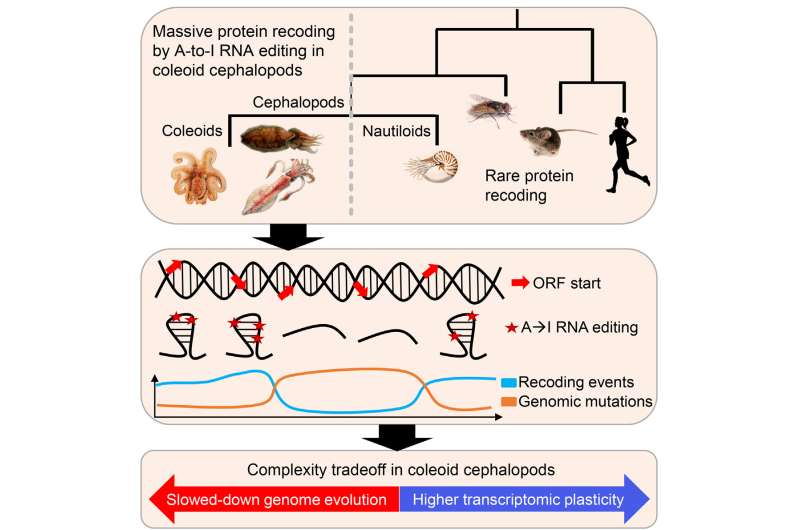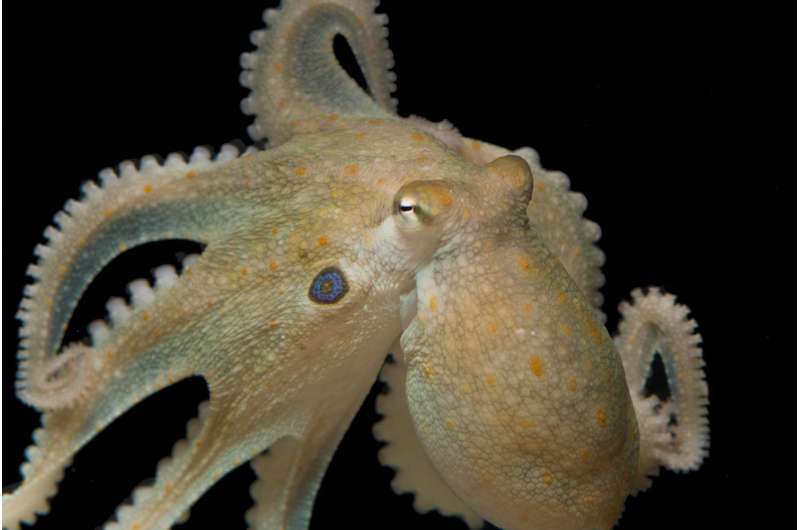How octopuses, squid, and cuttlefish defy genetics' 'central dogma'

Octopuses, squid, and cuttlefish often do not follow the genetic instructions in their DNA to the letter. Instead, they use enzymes to pluck out specific adenosine RNA bases (some of As, out of the As, Ts, Gs, and Us of RNA) that codes for proteins and replace them with a different base, called Inosine. This process—called "RNA editing"—is rarely used to recode proteins in most animals, but octopuses and their kin edit RNA base pairs in over half of their transcribed genes. When researchers did experiments to quantify and characterize the extent of this RNA editing across cephalopod species, they found evidence that this genetic strategy has profoundly constrained evolution of the cephalopod genome. The study appears in Cell on April 6.
Researchers have found that octopuses use RNA editing to rapidly adapt to temperature changes (DOI: 10.1126/science.1212795) and that the majority of RNA transcripts in squid neurons contain these edits (DOI: 10.7554/eLife.05198). In the new study, researchers hoped to find out how commonplace these edits are, how they evolved along the cephalopod lineage, and how such extraordinary editing capabilities affect the evolution of the cephalopod genome.
Vertebrate cells are capable of RNA editing, but we use it very rarely. Humans have 20,000 genes but only a few dozen conserved RNA editing sites that are likely encoding functional proteins. Squids also have about 20,000 genes but have at least 11,000 active RNA editing sites affecting the proteome, many of which are conserved, according to this study's estimates. "Basically, this is a mechanism to make proteins that are not encoded in the DNA. They are not present in the genomic sequence," says study co-author Eli Eisenberg, a biophysicist at Tel Aviv University in Israel. "With these cephalopods, this is not the exception. This is the rule. The rule is that most of the proteins are being edited."
In fact, RNA editing is so rare that it's not considered part of genetics' "Central Dogma." "Ever since Watson and Crick figured out that genetic information is stored in DNA, we've had this view that all the information is stored in DNA, and it's faithfully copied to another molecule when it's used—that's RNA, and from there, it's translated into the proteins that do all the work. "And it's generally assumed that that's a pretty faithful process," explains study co-author Joshua Rosenthal, a cephalopod neurobiologist at the Marine Biological Laboratory in Woods Hole, MA. "What the squid RNA is showing is that that's not always the case—that, in fact, organisms have developed a potent means to manipulate information in RNA."
Analysis across different cephalopod species revealed that this pattern held true in two species of octopus, the common cuttlefish, and one species of squid, all of which belong to the "coleoid" subclass within cephalopods, which are-known for their complex hunting and social behaviors. However, when the researchers checked for signs of RNA editing in one of the octopus's more distant relatives, the chambered nautilus, they found much lower levels of RNA editing. RNA-editing levels were also low in the California Sea Hare, a non-cephalopod mollusk that the researchers used for comparison.

Extensive RNA editing turned out to have robust evolutionary consequences. RNA editing enzymes can only happen to base pairs that are surrounded by a large RNA superstructure. If the bases on either side of the editing target mutate, then the organism may lose the ability to edit that target. Avid RNA recoders, like octopuses and squid, cannot afford DNA mutations in their RNA-editable genes, so they've surrendered the benefits of a frequently mutating DNA genome in favor of RNA editing, the researchers found.
Most organisms extensively use splicing, the process of cutting or adding whole sections of RNA transcripts before they leave the nucleus, to diversify their proteomes, but prioritize DNA flexibility over RNA editing. "We usually think of evolution using whatever it can to answer some challenges—so why was RNA recoding not used?" says Eisenberg. "Now, we have an example of what happens when we do use RNA editing abundantly. We know there's a price. The price is slowing down genome evolution...Cephalopods probably chose to take this RNA bargain over genome evolution, and maybe vertebrates made the other choice—they preferred genome evolution over editing."
Since many of the most heavily edited RNAs coded for key neural proteins, the researchers wonder whether RNA editing might contribute to the remarkable intelligence of octopuses and their kin. Not only are they smart enough to hunt, octopuses are clever enough to escape from jars, use coconut husks to hide themselves, signal to others by changing their skin color, and learn through observation.
"They're the only taxon out there that approaches vertebrates in terms of behavioral complexity," says Rosenthal. "These behaviorally complex coeloids all have this tremendous RNA editing, particularly in their nervous system, where they're recoding the messenger RNAs that encode for the very things that are important for electrical excitability."
Researchers are working on an octopus animal model to find out whether RNA editing plays a pivotal role in cephalopod behavior. Experiments that deal with the role of RNA editing in behavior will require an octopus that grows well in laboratories and can be genetically manipulated.
"RNA editing is an elegant system to add flexibility to your genetic information," says Rosenthal, "but it's a real challenge to figure out when it's being used and how it's being used."
More information: Cell, Liscovitch-Brauer et al.: "Trade-off between Transcriptome Plasticity and Genome Evolution in Cephalopods" www.cell.com/cell/fulltext/S0092-8674(17)30344-6 , DOI: 10.1016/j.cell.2017.03.025
Journal information: Cell
Provided by Cell Press



















